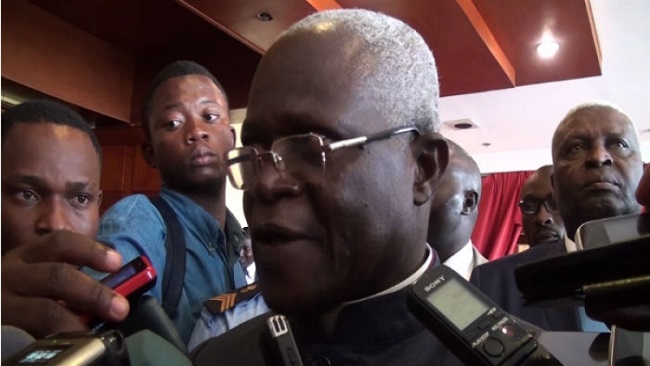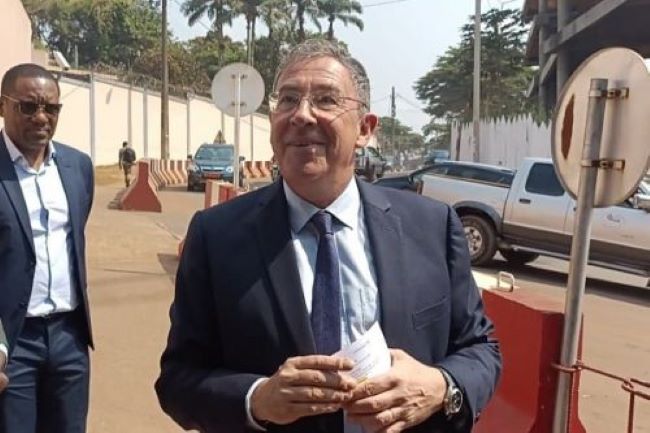7, December 2024
US: Brenda Biya wins first round of Singer Dencia’s suit against her 0
The daughter of the president of Cameroon won a round in court when a judge quashed the lawsuit summons ostensibly served on her by a singer from that African country, in which the fashion-conscious entertainer says the leader’s offspring and a friend defamed the plaintiff on social media.
Known professionally as Dencia, the plaintiff’s real name is Reprudentia Sonkey. Dencia is known for her own fashion statements and appearances on red carpets at the Billboard Music Awards, the Grammys, and the American Music Awards.
Dencia, 32, brought the Van Nuys Superior Court suit against Anastasie Brenda Biya Eyenga, the daughter of Cameroon President Paul Biya, and a friend of Eyenga, Marie Therese Yabit. The complaint also alleges civil harassment and both intentional and negligent infliction of emotional distress.
On Thursday, Judge Huey P. Cotton granted a motion by Eyenga finding that she was not properly served. Eyenga’s attorneys contended that the alleged service of documents at the Hilton Hotel Yaounde in Cameroon by a bailiff was insufficient.
“The proof of service should include an affidavit from the bailiff detailing the manner of service, the exact location and the recipient’s acknowledgment of receipt,” Eyenga’s lawyers contended in their pleadings. “No such documentation exists or was provided.”
In addition, no room number or other specific location within the hotel is provided, making it unclear where exactly the service took place, according to Eyenga’s attorneys’ court papers.
The attempted service complied with neither California nor Cameroonian law, Eyenga’s lawyers further stated.
The judge granted a similar motion to quash in Yabit’s favor.
Dencia seeks at least $75 million in damages in the suit brought in March 2023. The Simi Valley attorney is representing herself and appeared in court for Thursday’s hearing.
In addition to being an entertainer, Dencia has created several skin care and clothing brands, set up various businesses and founded the skin care brand Whitenicious by Dencia, of which she was the president and CEO, the suit states.
Her companies flourished due to her reputation as a popular Cameroonian singer and trustworthy entrepreneur in skin care products, the suit states.
In July 2015, Dencia was contacted by Eyenga’s public relations manager, who told the plaintiff that Eyenga, who eventually moved to Beverly Hills, admired her work and wanted her help in producing a photo shoot and in setting up her own brand, the suit states.
“During the years that followed, both (Dencia) and Eyenga maintained a cordial relationship,” the suit states. “They would both make text exchanges on a regularly basis.”
Eyenga returned to Cameroon in 2019 and the two lost contact, the suit states. In June 2021, Dencia was preparing to go to Cameroon the next month in the company of other musicians, including rapper Trey Songz, when a representative for Eyenga allegedly contacted the plaintiff about a birthday engagement and performing at Eyenga’s new hotel.
Eyenga asked Dencia for help getting her Instagram account certified, the suit states. But in a subsequent dispute, Eyenga accused Dencia of creating a fake account and trying to impersonate her, even though the plaintiff explained she was preoccupied with the death of her sister from cancer and could not help Eyenga get her account certified as the plaintiff had hoped, the suit states.
Eyenga, allegedly with Yabit’s help, accused Dencia on social media of identity theft and of being a “scammer” and a “fraudster,” the suit states.
“The news quickly made a media buzz about (Dencia) based on Eyenga’s allegations,” the suit states. “(Dencia’s) reputation was being trampled on by the daughter of the president of the Republic of Cameroon in a totally unjustified way.”
Dencia’s companies suffered losses and the stature she worked hard to establish has been damaged, causing her emotional distress, according to her suit, which further seeks a court order preventing any more allegedly defamatory postings.
In addition to her skin care line, Dencia has designed outfits for such artists as Nicki Minaj, Rihanna and Christina Milian.
Source: MyNewsLA.com




























9, December 2024
Francophone-Anglophone education systems: Nalova explains Baccalaureate pass rate harmonization 0
The passing grade for the francophone general baccalaureate in Cameroon was set at 10 out of 20 to ensure “equity” between the francophone and anglophone education systems, Minister of Secondary Education Nalova Lyonga told lawmakers.
“In previous years, students in the francophone subsystem were admitted to exams with an average score below 10, whereas those in the anglophone subsystem had to achieve a score of 10 or higher,” Minister Nalova Lyonga said during a December 4 appearance before the National Assembly’s Finance Committee. This decision was necessary to “harmonize the two subsystems,” she explained.
This harmonization led to a dramatic decline in the 2024 francophone baccalaureate pass rate, which fell to 37%, the lowest in 20 years.
The Ministry of Secondary Education did not provide an official explanation for the poor results, which were released in July. However, teachers interviewed said that unlike in previous years, there were no post-correction deliberations in 2024. These deliberations had previously allowed candidates with scores below 10 to be “rescued” by examination boards. As a result, only candidates who achieved a final average of 10 or higher after the exam grading were declared successful.
This policy is expected to continue. In September, during the start of the school year, Minister Lyonga announced in Bafoussam that there would be no further “rescues” for candidates scoring below an average of 10.
Source: Business in Cameroon